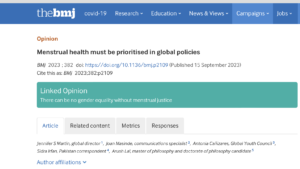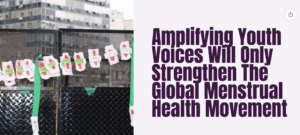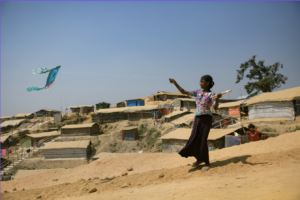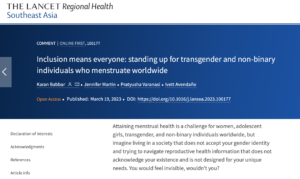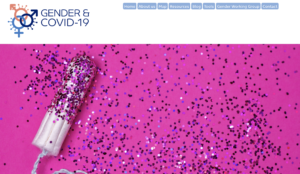Ivy Crane Kutswa, Pandemic Periods Global Youth Council, Kenya
Today, we celebrate International Day of the Girl Child 2023! In today’s fast-paced world, it is easy to overlook the importance of comprehensive menstrual health education despite the persistent global issue of period poverty affecting millions of adolescent girls and women worldwide. The lack of access to not only menstrual health tools, including but not limited to menstrual products, washing facilities and waste management, but also menstrual education is a public health crisis that needs to be addressed. Despite often being overlooked, the significance of comprehensive menstrual health education is undeniable. Unfortunately, the inadequate understanding of menstruation continues to persist as a prevalent public health and human rights issue impacting millions globally and results in feelings of shame, stigma from society and potential health risks.
As the Pandemic Periods Global Youth Council, we are joining forces on the Day of the Girl Child to advocate for comprehensive menstrual health education and the importance of involving youth in menstrual health movements. Together, we emphasise the urgency of this mission, drawing inspiration from the personal narratives of our Global Youth Council members, which underscore this mission’s significance and relevance.
As much as menstrual health education is a fundamental component of sexual and reproductive health, it is poorly implemented in schools and society worldwide. Inadequate menstrual health education perpetuates myths, encourages stigma and, more often than not, spreads misinformation. This knowledge gap leaves young people unprepared and uninformed about a natural process that affects them directly or indirectly throughout their lives. Countless people experience confusion and embarrassment during their first menstruation (menarche), highlighting the vital need for accessible, inclusive and accurate education on this critical aspect of human biology.
To deeply understand the repercussions of insufficient menstrual health education, let us listen to the personal narratives of members of the Global Youth Council of Pandemic Periods. From their point of view, we will glean valuable perspectives on the challenges young people face worldwide.
The associated societal stigma rooted deeply in cultures may result in overwhelming anxiety with suicidal tendencies. It is important to note that open communication regarding menstruation helps empower girls and anyone who menstruates as they learn the anatomy and autonomy of their bodies, which can reduce feelings of shame and embarrassment and promote positive body image.
In many countries, girls who lack access to menstrual hygiene products and most certainly menstrual education are more likely to miss school during their periods because of shame or societal stigma associated with menstruation, leading to lower academic performance and reduced opportunities for future success. This can contribute to poverty and inequality, as girls who miss school are less likely to achieve economic independence and contribute to their communities.
Furthermore, a lack of adequate menstrual health education can lead to harmful myths and stigmas surrounding menstruation, unhealthy menstrual practices, misconceptions and negative attitudes, which motivate shaming, bullying and even gender-based violence. This can lead to social isolation and lack of support from peers and family members, further exacerbating the negative impact of period poverty on girls’ mental health and wellbeing.
Youth are not just ‘leaders of tomorrow’ or the future; they are the driving force of change in the present! Therefore, in the menstrual movements, it is crucial to include the perspectives of adolescent girls and youth in the co-design of inclusive and right-based menstrual health education. Studies have shown that menstrual health education and programs associated with menstrual health are more effective when designed with the target audience’s input. Involving the youth in menstrual health education and the menstrual movements will undoubtedly create a more inclusive and informed society. By amplifying youth voices and sharing their narratives, we can underline the urgency of menstrual health movements and promote effective, engaging and inclusive programs that will address the crisis of inadequate menstrual health education tools.
Involving the youth in the menstrual health movements creates a fresh perspective for decision making, and most importantly, this provides a familiar face and safe space for girls and younger people who menstruate to ask questions and seek support without judgment. This, in turn, promotes open and honest discussions around menstrual health. We, therefore, must normalise menstruation as a natural and healthy aspect of life. By amplifying the voices of youth and highlighting the urgency of inclusion, we can significantly impact menstrual health education and ensure that no one is left behind in this crucial conversation.


